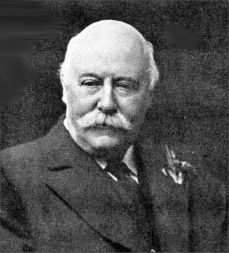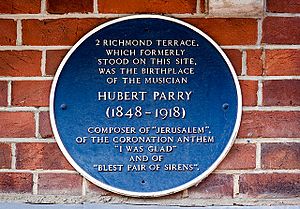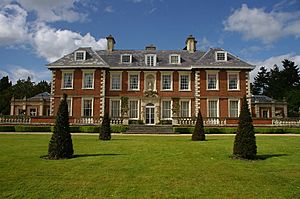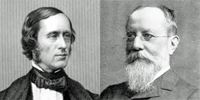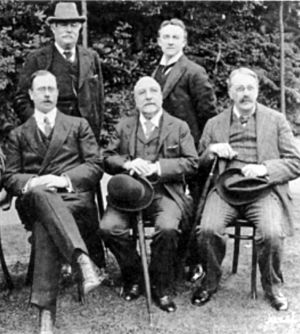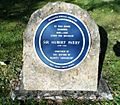Hubert Parry facts for kids
Sir Charles Hubert Hastings Parry (born February 27, 1848 – died October 7, 1918) was an important English composer, teacher, and music historian. He was born in Richmond Hill, Bournemouth. His first major musical pieces came out in 1880.
Parry is famous for several well-known works. These include the song "Jerusalem", which is often sung. He also wrote the coronation anthem "I was glad" for King Edward VII in 1902. Other famous pieces are the choral and orchestral work Blest Pair of Sirens and the hymn tune "Repton," used for "Dear Lord and Father of Mankind". He wrote five symphonies and other orchestral music. Parry also composed the music for Ode to Newfoundland, which became the official song for Newfoundland and Labrador in Canada.
At first, Parry tried working in insurance because his father wanted him to. But his love for music was too strong. He was helped by George Grove, who was a big name in music. Parry first wrote articles for Grove's huge Dictionary of Music and Musicians in the 1870s and 1880s. Then, in 1883, he became a professor at the Royal College of Music, where Grove was the first head. Parry later took over from Grove as head of the college in 1895 and stayed there for the rest of his life. He also taught music at the University of Oxford from 1900 to 1908. He wrote several books about music history, with his 1909 book on Johann Sebastian Bach being very well-known.
Parry's music was seen differently by people over time. His teaching jobs took up a lot of his time, so he couldn't always focus on composing. Some composers like Charles Villiers Stanford thought he was the best English composer since Henry Purcell. Others, like Frederick Delius, didn't agree. However, Parry had a big impact on many later composers. Edward Elgar learned a lot from Parry's articles. Famous students who learned from Parry at the Royal College of Music include Ralph Vaughan Williams, Gustav Holst, Frank Bridge, and John Ireland.
Parry also loved sailing. He owned two yachts, The Latois and The Wanderer. In 1908, he became a member of the Royal Yacht Squadron, which was a special honor for a composer.
Contents
Biography
Early Life and Family
Hubert Parry was born in Richmond Hill, Bournemouth, on February 27, 1848. He was the youngest of six children. His father was Thomas Gambier Parry, and his mother was Isabella Fynes-Clinton. His mother died when Hubert was only twelve days old. He grew up at Highnam Court, a large house in Gloucestershire, with his older brother Clinton and sister Lucy. His father remarried in 1851 and had more children.
Hubert's father, Gambier Parry, was very wealthy. He collected old Italian art and was also a talented painter. He loved music too and played the piano and French horn. However, he thought music was just a hobby, not a proper job for a gentleman. This meant he didn't want Hubert to become a professional musician.
Hubert's early childhood was often lonely. His brother Clinton was away at school, and his sister Lucy was much older. He spent a lot of time with his governess.
School and Early Music Lessons
From 1856 to 1858, Hubert went to a school in Malvern. Then he moved to Twyford Preparatory School in Hampshire. At Twyford, his interest in music grew. Two organists, Samuel Sebastian Wesley and Edward Brind, encouraged him. Wesley taught him to love the music of Johann Sebastian Bach. Brind gave Parry piano and basic music theory lessons. He also took Parry to the Three Choirs Festival in 1861. This festival had many famous musical works, and it made a big impression on Parry. It was the start of his long connection with the festival.
In 1861, Parry went to Eton College. Around this time, his sister Lucy died. This deeply affected him. At Eton, Parry was good at both sports and music. He even showed early signs of heart problems, which he would have for the rest of his life.
Eton wasn't known for its music at the time. So, Parry studied composition with George Elvey, the organist at St George's Chapel, Windsor Castle. Elvey was a traditional musician, but he helped Parry learn important skills like writing canons and fugues. He also introduced Parry to the music of Joseph Haydn and Wolfgang Amadeus Mozart. Parry also explored the music of Ludwig van Beethoven and Felix Mendelssohn on his own. While still at Eton, Parry passed the Bachelor of Music exam at Oxford. He was the youngest person ever to do so. His exam piece was a cantata called O Lord, Thou hast cast us out, which impressed his teachers.
Oxford and a New Direction
In 1867, Parry went to Exeter College, Oxford. His father still wanted him to have a business career, so he studied Law and Modern History, not music. During one summer break, he studied music in Stuttgart, Germany. This experience made him think differently about music. He started to prefer the music of Robert Schumann and Beethoven over Mendelssohn. He found their music more exciting and adventurous.
Starting a Career and Composing
After Oxford, Parry worked in insurance at Lloyd's of London from 1870 to 1877. He didn't like this job at all, as it wasn't creative. But he felt he had to do it for his father and his future in-laws. In 1872, he married Elizabeth Maude Herbert. They had two daughters, Dorothea and Gwendolen.
While working in insurance, Parry kept studying music. He took lessons from Edward Dannreuther, a pianist and teacher. Dannreuther helped Parry with piano, analysis, and composition. He also introduced Parry to the music of Richard Wagner, which influenced Parry's own compositions.
Parry also began working as a music scholar. George Grove hired him as an assistant editor for his new Dictionary of Music and Musicians in 1875. Parry wrote 123 articles for the dictionary. These writings were very helpful to young musicians like Edward Elgar, who learned a lot from them. In 1883, Grove, who was the first director of the new Royal College of Music, made Parry a professor of composition and music history there.
Parry's first important works came out in 1880. These included a piano concerto and a choral piece based on Shelley's Prometheus Unbound. This performance is sometimes seen as the start of a "renaissance" (a rebirth) in English music. However, some critics thought it was too modern. Parry had more success with his ode Blest Pair of Sirens in 1887. This piece was praised by Charles Villiers Stanford, who thought Parry was the best English composer since Purcell. Blest Pair of Sirens made Parry famous as a leading English composer of choral music.
Peak Years and Leadership
As Parry became well-known, he received many requests to compose new works. These included choral pieces like Ode on Saint Cecilia's Day (1889) and the oratorios Judith (1888) and Job (1892). He also wrote a fun piece called The Pied Piper of Hamelin (1905).
Even though critics at the time thought Parry's orchestral music was less important, many of his orchestral pieces have been performed again recently. These include his five symphonies, a set of Symphonic Variations, and the Overture to an Unwritten Tragedy (1893). Parry also wrote music for plays at Cambridge and Oxford universities, including The Birds by Aristophanes in 1883.
In 1895, Parry became the director of the Royal College of Music, taking over from George Grove. He held this important job until he died. In 1900, he also became the Heather Professor of Music at Oxford. Many believed that these academic jobs kept him from composing more. However, Ralph Vaughan Williams, who studied with Parry, thought he was a great composer and teacher.
As head of the Royal College of Music, Parry taught many talented students. Among them were famous composers like Ralph Vaughan Williams, Gustav Holst, Frank Bridge, and John Ireland.
Parry had strong personal beliefs, including Darwinian and humanist ideas. He tried to create new types of choral works, which he called "ethical cantatas." These were experiments to move beyond traditional forms. While they weren't always popular, some, like The Soul's Ransom (1906), have been performed more recently.
After his stepmother died in 1896, Parry inherited the family estate at Highnam. He was knighted in 1898, becoming Sir Hubert Parry. In 1902, he was made a Baronet, which is another special honor.
Last Years and Legacy
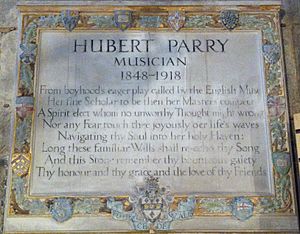
Parry left his Oxford job in 1908 due to health reasons. In his last ten years, he wrote some of his most famous pieces. These include the Symphonic Fantasia 1912 (also called Symphony No. 5) and the Songs of Farewell (1916–1918). His most famous piece, the setting of William Blake's poem "And did those feet in ancient time" (1916), quickly became popular with the women's suffrage movement, which both Parry and his wife supported.
Parry greatly admired German music and culture. He was very sad when World War I started, as he believed Britain and Germany would never fight each other. During the war, he helped musicians who were struggling.
In the autumn of 1918, Parry caught the Spanish flu during a worldwide pandemic. He died on October 7, 1918, at the age of 70. He was buried in St Paul's Cathedral in London. A blue plaque marks his birthplace in Bournemouth. There is also a memorial tablet in Gloucester Cathedral. After his death, his special title of Baronet ended.
Works
Music
Some people thought Parry's music was traditional and not very creative. However, others, like the American writers Nicholas Slonimsky and Laura Kuhn, said that Parry played an important role in developing British symphonic music. They noted that his orchestral works were influenced by German Romantic composers like Mendelssohn, Schumann, and Brahms. But they also said he developed his own style, known for its excellent craftsmanship. His five symphonies show how he became better at writing large musical forms. He also wrote good music for plays and chamber pieces.
The early influence of Wagner can be heard in some of Parry's orchestral works from the 1870s and in Scenes from Prometheus Unbound. The influence of Brahms can be heard in his chamber music, like the Piano Quartet in A flat (1879).
Books on Music
Parry wrote about music throughout his life. Besides his many articles in Grove's Dictionary, he published several books. These include Studies of Great Composers (1886) and The Art of Music (1893), which was later expanded to The Evolution of the Art of Music (1896). This book is considered a very important work in English music literature. He also wrote The Music of the Seventeenth Century (1902) and Johann Sebastian Bach (1909), which was considered his most important book.
Images for kids
See also
 In Spanish: Hubert Parry para niños
In Spanish: Hubert Parry para niños
 | Frances Mary Albrier |
 | Whitney Young |
 | Muhammad Ali |


